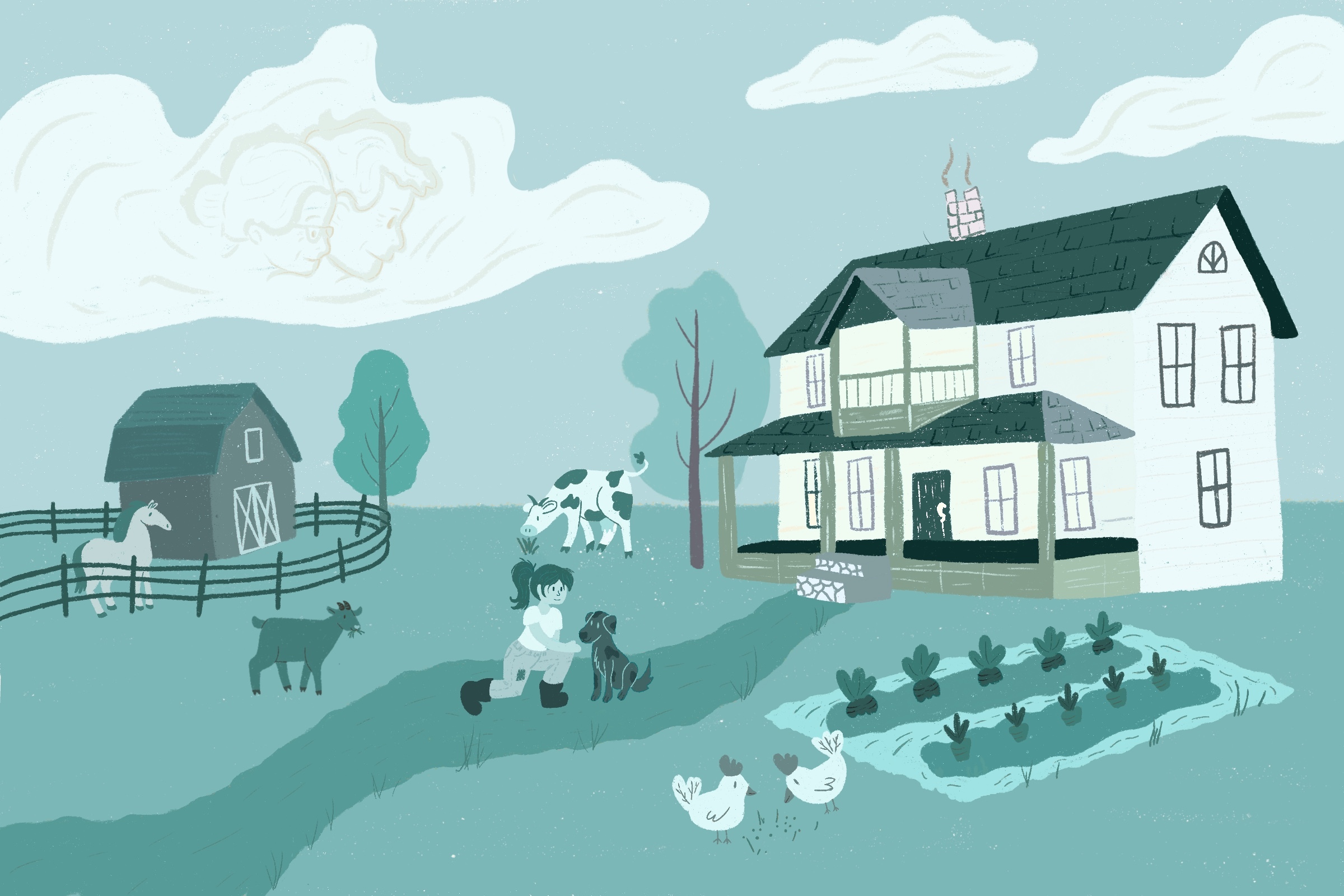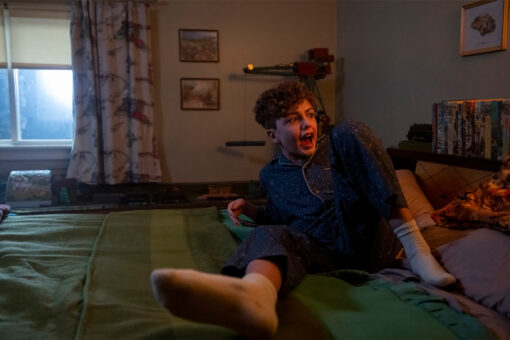For several years, the Isaac Bashevis Singer Literary Trust has been actively publishing unreleased and untranslated works by the legendary Yiddish writer, which have appeared in the New Yorker, Harper’s, and the Paris Review, among many others. Alma is thrilled to share one such story, “Apudzhas Came to Say Goodbye.” This translation was made by Singer with his handwritten corrections on the original English-language manuscript. The original Yiddish was published in the Forverts on Jan 22, 1976.
Sylvia Cohen sounds like an average name, but Sylvia Cohen was far from average. At the age of seventeen Sylvia resolved to dedicate her life to God’s suffering creatures. It happened on the day her father, Sam Cohen, died in an automobile accident. Sylvia’s mother, Leah, had died two years earlier in a fire caused by a short circuit. Sam Cohen had left his only daughter an insurance policy that would bring her two hundred dollars a month. She had just graduated from high school and was about to enter Hunter College, but on the day her father died, she decided that she had had enough of civilization and its victims.
It happened to be that in the previous summer, Sylvia had spent her vacation on a farm near Woodridge and Mountaindale in the Catskill Mountains. She had often taken long solitary walks through the region. Most of the guests at the farm spent the long summer days and often late into the night playing cards. They also discussed at length the bargains one could find in the New York department stores and in the pushcarts on Orchard Street. But Sylvia had no patience either for cards or bargains. She liked the stillness of the forest and observing God’s creatures, especially birds – she had read a lot about the life of birds.
The Cohens had lived on the fourth floor of a tenement in Brownsville. The apartment included a fire escape, and a pigeon had built her nest there, brooding three eggs. Each day, the father of these eggs came to replace the mother while she flew off to seek food for herself and, later, for the newly-hatched young. The mother didn’t have to search far, for Sylvia fed the whole family a mixture of millet and groats that she bought in a nearby pet store. Sylvia had her own three parakeets that she kept in a cage which always stood open. She also had a dog, Apudzhas, and a cat, Akota.
Once, while walking in the Catskills, Sylvia came to a farm lying several miles from Mountaindale. The farm belonged to an elderly couple, Morris and Yetta Hurwitz. Morris Hurwitz had for many years been a presser in a sweater factory in Brooklyn, but in his old age he had bought a farm. The ground was full of rocks but the property included a number of apple trees and enough grass to pasture a cow, a goat, and a horse. Yetta Hurwitz also kept chickens, ducks, and a small garden where she grew onions, tomatoes, carrots, potatoes, and red radishes, as they use to be called in the old country, Poland. Every few days Morris Hurwitz would hitch his mare, Klacza, to a buggy and go, sometimes with his wife Yetta and sometimes without her, to Montaindale to buy necessities and to pick up his mail – which consisted mostly of copies of a Yiddish newspaper from New York which the husband and wife read from beginning to end, including all the advertisements. The household also included two dogs, three cats, and two canaries. Morris Hurwitz received social security and a pension from the trade union to which he had belonged for over forty years.
In the few hours Sylvia spent with the Hurwitzes, she fell in love with them. She had never met old people so content with their lot as this couple. It was quite enough for them to do the farm work, read the newspaper, and listen to the radio, on which one could occasionally get Yiddish programs from New York. Morris Hurwitz said that he didn’t spend even half the money he got from his pension and his social security. They had all the clothes they needed and they required no luxuries. Morris Hurwitz sent generous donations to refugees from Hitler as well as to charitable institutions in New York and in Israel. Only twice a year the couple spent several days in a hotel in Mountaindale – on Passover and on Rosh Hashonah and Yom Kippur. Winters, it often snowed heavily here and Morris Hurwitz would hitch Klacza to a sleigh instead of the buggy. Neither Morris nor Klacza feared snow. In Poland, where the Hurwitzes had come from, the snow covered the towns and the roads all winter and no one shoveled it away.
Not only did Sylvia fall in love with the Hurwitzes, but the old couple also grew enamored of this earnest girl.
Morris proposed to Sylvia, “Since you like it so much here, come live with us.”
“We’ll adopt you as a daughter,” Yetta Hurwitz added. “Our daughter, Mildred, lives in Winnipeg in Canada and we hardly ever see her.”
“What would my father say?” Sylvia asked. “He wants me to study dentistry, but I haven’t the slightest urge to drill people’s teeth. I’d rather dedicate my life to helping God’s creatures.”
Now that Sylvia had become an orphan, she decided to do what she had always wanted. She called the Hurwitzes. They had an old-fashioned telephone hanging on the wall and if you wanted to make a call you had to turn a crank. Sylvia managed to make the connection and Morris Hurwitz answered. His voice had changed. It sounded hoarse to Sylvia, and as if cracked.
Morris recognized her voice at once. When Sylvia asked about Yetta, Morris paused a moment then said, “Yetta fell and broke her hip. She just came back from the hospital in New York and she can’t come to the phone.”
When Sylvia told Morris that she wanted to move to the farm, Morris began to cough and sputter like someone struggling to hold back his tears.
He said, “God Himself has sent you to us!”
For the entire year-and-a-half that Yetta lay sick, Sylvia served as both housekeeper and nurse. After Yetta’s death, Morris lived another two years. He had grown so old and feeble that he even lacked the strength to go to town for supplies and the mail, and Sylvia did this for him. The daughter came from Winnipeg to pay her father a visit, but she had four children of her own and couldn’t stay long. Before he died, Morris made a will leaving the farm and the house to Sylvia.
After Morris’s death Sylvia was left all alone, but she was surrounded by so many creatures that depended on her, that she didn’t feel lonely. God’s creatures apparently sensed that they had a friend in Sylvia and they came to her when they were in trouble. Now a lame dog strayed to the farm, now a sick cat. Now a crow with a broken wing landed on the porch, and now a marten who had apparently fought with a porcupine and had to have the quills removed from his muzzle and nose. Sylvia had brought along a number of books dealing with the care and treatment of sick animals as well as medicines. At times, she even operated on some of the creatures, or used anesthetics to put them out. The neighborhood farmers heard that Sylvia treated animals for free and came to her instead of the veterinarian who was far away. Besides, some of the farmers in the Catskills were too poor to afford a veterinarian.
In spring, summer, and even in autumn, Sylvia had lots of company. Occasionally, guests from the hotels out for a stroll stopped at the farm for a glass of milk or a brief chat. It happened that a car broke down along the road and the driver came in to phone for assistance or to get a can of water. Late in summer, Sylvia had to hire a laborer to help pick the apples she later sold to stores in Mountaindale. Although Sylvia was American-born, she had become accustomed to reading the Yiddish newspaper which contained articles seldom printed in English papers, accounts of kibbutzim in Israel, descriptions of Jewish life in various lands, as well as the novels and stories the Yiddish press printed in installments. Each time Sylvia read something she liked she thought about Morris and Yetta. How they would have loved that article! Morris’s eyes would light up whenever he read something that particularly intrigued him. He would say: “One must thank God there are writers in the world! What flavor would life have without writers, without newspapers or magazines?”
How strange! Morris and Yetta were dead, yet Sylvia often sensed their presence. At night she dreamed of them just as she did of her own parents. Sometimes Sylvia literally felt that Morris and Yetta were nearby. Their spirits hovered within this old house where they had spent their best years. At times Sylvia even imagined that they spoke to her. Once she put a pan of milk on the stove to boil and forgot all about it. Suddenly she heard Yetta’s voice cry out: “Sylvia, the milk will boil over!”
Sylvia shivered, then quickly dashed into the kitchen. Another time in the summer, when Klacza was grazing all night outside, Morris came to Sylvia in a dream and yelled into her ear, “The grass is wet, Klacza will get sick!”
Sylvia awoke all atremble. It had rained during the night and Klacza was eating a lot of wet grass which bloated her stomach. It happens that a horse or a cow died from eating too much wet grass and Sylvia promptly led Klacza into the stable and saved her from death.
“Can it be that the spirits of the dead remain in a house and watch over the household?” Sylvia wondered. “Or did these voices come from my own subconscious?”
But what was the subconscious? What were people generally with all their troubles, their yearnings, their dreams? What was life? What was consciousness? Sylvia had believed that animals possessed mysterious powers. Dogs, cats, and birds could read the human mind. The animals communicated among themselves through mind reading.
Apudzhas, the dog that had once belonged to her father, had had a son on the farm, and Sylvia named him Apudzhas Junior. One day, Apudzhas Junior disappeared. It happened in autumn. Sylvia went looking for him and to her distress found that the dog had wandered off on the road to Mountaindale and had been run over by a car. Someone had laid his body by the side of the road. Sylvia felt herself congeal as if from anguish. After a while she picked up the body of her beloved pet and brought it back to the farm. There, she dug a grave and buried him. That day, the other dogs on the farm howled, whimpered, and refused to eat. They lamented their departed friend.
It was a bitter day for Sylvia. Late that evening she fell into bed and sank into a deep sleep. Precisely at daybreak she was awakened by a dog barking. Sylvia recognized Apudzhas’s voice. “How can this be?” she asked herself.
She opened the front door and by the light of the rising sun she saw Apudzhas Junior standing there and looking at her. His eyes seemed to say, “Yes, it’s me. I’ve come to say goodbye.”
Soon after, his form dissolved and turned to nothing.
Such events can’t be easily dismissed. For days afterwards Sylvia went around as if in a daze. One day she sat down and in her broken Yiddish she wrote a long letter to the Yiddish newspaper she read. Even as she did this she was convinced the letter would never be printed, but two weeks later she was astonished to see her name in the paper. The editor had printed the entire letter, merely correcting the grammar.
Not long afterward, letters started coming in to Sylvia from a number of readers who had enjoyed similar experiences with dogs, cats, birds – even people. Some of these accounts astounded Sylvia. It seemed life didn’t end with the collapse of the body. There remained some force that could assume the appearance of the deceased being and come to express a final thanks or last wish.
One of these letters was from a veterinarian. His letter was the longest and most interesting of all. He wrote of a dog that not only appeared after death to say goodbye to his master, but even lay at his master’s feet at night like he used to do in life. One night, when robbers broke into the house, this phantom dog attacked them and saved his master’s life.
This letter led to an acquaintance which blossomed into a friendship, and eventually led to a marriage between Sylvia and the veterinarian. The farm where Sylvia had for so many years helped the creatures all by herself became an animal hospital, reservation where God’s creatures of every species could find food and security. Sylvia and her husband often said that the time was coming when people would stop eating the flesh of animals and wearing their skins, furs and feathers. In a just world, hunting would be considered not a sport but a crime.
Published with the kind permission of The Isaac Bashevis Singer Literary Trust. Copyright c 2021 The Isaac Bashevis Singer Literary Trust. All rights reserved.



